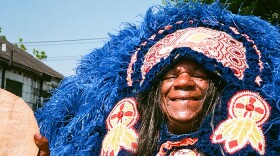-
Each year, Mardi Gras Indians greet the day on the city streets to sing and strut. This has been going on since the late 19th century. The call and response sounds of the Indians often carry the Congo beat, fundamental in New Orleans' musical fabric. The beloved Indian Chief Monk Boudreaux has been masking Indian for more than 70 years. We visited him at home, where he quietly sewed his new suit.
-
Our guest is modern saxophonist Charles Lloyd, who also built a sound in Los Angeles, riding a wave of free jazz and beyond. He played alongside everyone from Ornette Coleman to the Jefferson Airplane. His fluid music carried him out of the city to the California Coast, where he hung with the Beach Boys and found internal peace. But before all that, Charles Lloyd discovered his love for the saxophone through the blues in his hometown of Memphis.
-
Joe Ely, a native of West Texas, absorbed the honky-tonk, western swing and rock ‘n’ roll of his youth. He ran away from home at age sixteen to see the world and play music. He later returned to Lubbock and formed the Flatlanders with friends Jimmie Dale Gilmore and Butch Hancock, eventually landing in and leading Austin’s cosmic cowboy scene. Before he passed in December 2025, Joe Ely divided his time between the road and the Lone Star State.
-
The Savoy-Doucet Cajun Band has been playing together since 1977. The band includes husband and wife Marc and Ann Savoy, on accordion and guitar respectively, and Michael Doucet of Beausoleil on fiddle. The trio has presented traditional Cajun music at Louisiana dance halls, major music festivals, and presidential inaugurations. They recently played a Cajun dance party in New Orleans’ French Market for the National Treasures Tour of Culture Bearers in National Parks. I sat down back home with the Savoys and Michael Doucet to talk about the band and their relationship as friends, family, and musicians. First, I asked Marc Savoy about his choice to continue family traditions of making and playing accordions.
-
The Gullah Geechee people are descendants of those enslaved in the Sea Islands of Florida, North Carolina, Georgia and South Carolina. Because of the remoteness of the plantations, the Gullah Geechee were able to retain some of their African traditions, including the ring shout. It’s a ritual in which participants move counterclockwise in a circle while shuffling and stomping their feet and clapping their hands, in call and response fashion. The tradition is rooted in West African culture, mixed with elements of Christianity. The Gullah Geechee Ring Shouters from Darien, Georgia have preserved this ancestral heritage through performance and education since 1980. They joined us on stage at the New Orleans Jazz Museum where they started with a song you will probably recognize, that came from the Gullah Geechee culture.
-
This is American Routes from New Orleans, a city of music and songs, many of which have been written about it, often by outsiders. “Way Down Yonder in New Orleans"–music by John Turner Layton and lyrics from Henry Creamer–was published in 1922. “Way Down Yonder” was advertised as "A Southern Song, without A Mammy, A Mule, Or A Moon.” That was a rightful dig at some of the Tin Pan Alley clichés of the day. “Way Down Yonder in New Orleans" has been performed by many: Benny Goodman, the Andrews Sisters, Freddy Cannon, Jan and Dean, and Dean Martin. And now let’s go “Way Down Yonder” and beyond, starting with a fresh version of the old song from New Orleans Jazz Vipers on American Routes.
-
Castro Coleman, also known as Mr. Sipp, was born in McComb, Mississippi. He grew up hearing his parents, grandfather, uncles, aunties, and cousins playing and singing music at home and in the church. He was also influenced by professional gospel groups, as well as the bluesman B.B. King, who inspired Mr. Sipp to pick up the guitar at age six. Sipp would go on to play B.B. King in the CMT network’s series, Sun Records. Mr. Sipp has gone on to receive many blues and gospel awards, but he has never let his music be defined by one style.
-
Each December 24th, along the Mississippi River above New Orleans, families gather around massive bonfires–some shaped as log cabins or animals–to light the way for Santa Claus or Papa Noel. It’s a holiday tradition that goes back to colonial times along what is now called the Côte des Allemands, the German Coast. I caught up with CJ and his young son CJ Jr. who were tending to a big bonfire on the levee in Lutcher, LA.
-
Songwriter and singer Joan Shelley prefers to make music in her hometown of Louisville, Kentucky rather than the industry centers of Nashville and New York City. She’s recorded a series of well-crafted contemplative albums with guitarist Nathan Salsburg at home in Louisville, at Jeff Tweedy’s Loft in Chicago, and even in Iceland. You’ll find references to rivers, waterways, and oceans in her songs and albums. We began asking her what the Ohio River means to her.
-
This week we remember the late Raul Malo, who passed away on December 8, 2025. Raul Malo was born in Miami to Cuban parents. In 1989, he started The Mavericks. Named for going against the grain, the Mavericks began in the punk and alternative scene and eventually found great success in country music, incorporating Latin, rockabilly, and pop sounds. By 2000, the group parted ways and Raul Malo pursued a solo career in LA. He joined Los Super Seven with Joe Ely, Freddy Fender, members of Los Lobos, Max Baca, Doug Sahm, and others. In 2012, Malo reunited with the Mavericks, releasing several albums and touring widely. In 2020, they released En Español, an album entirely in Spanish. Making a record like this took Raul many years of listening within and outside his family.

Play Live Radio
Next Up:
0:00
0:00
Available On Air Stations










